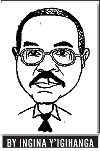As refugees in the 1960s, I remember there were times we thought we were blessed to be in such a situation.It sounds naïve – no, outright stupid – to think that you can be happy about living without the right to citizenship, but such is the hopelessness of a refugee that you’ll find it normal when people spit on you.When they give you food, you’ll worship them.


As refugees in the 1960s, I remember there were times we thought we were blessed to be in such a situation.
It sounds naïve – no, outright stupid – to think that you can be happy about living without the right to citizenship, but such is the hopelessness of a refugee that you’ll find it normal when people spit on you. When they give you food, you’ll worship them.
In Nshungerezi, in the south-western district of Uganda, they were giving us food. Today I know that the food came from the UN High Commission for Refugees (UNHCR) but we worshiped the people we saw dishing to us our rations and took them to be our saviours.
Knowing the way we revered them, they also made sure they capitalised on our glorification of them.
So, our parents competed for their favours, offering them drinks and daughters. Which meant selling part of our little rations and giving out our sisters to be abused. Still, we lived happily.
The food was sorghum. Yes, sorghum that we could never have used as food back in our country was now the principal item on our menu. However, it was not your usual ‘shenzi’ (ordinary?) sorghum and it was not the usual burnt-brick colour.
It was ‘mazungu’ (hybrid?): almost the size of maize and of greyish-white colour. Moreover, it did not come alone. It was accompanied by tinned soya-bean oil.
Today, I may laugh at such rations but those days they meant the heaven to us. In fact, sorghum prepared with soybean oil made a finger-licking delicacy many a youth was ready to die for.
For that, we took it as our breakfast, our lunch and our supper! Little problem was, considering that our breakfast consisted of the cold leftovers of the previous evening’s supper, woe unto you if you made the mistake of sitting next to a primary school pupil who was thus satiated after such a breakfast .
The gases that were emitted through their mouth were a lesson of ammonic study in a Chemistry class!
Alternatively, we received rations of fish. Even today, a delicacy especially for young ones, you’ll say. And I’ll concur, since again it did not come in the usual ‘shenzi’ sizes. It came split-up and salted and was the size of a split-up mature goat.
Only small problem again was, it was so heavily salted it took days of repeated boiling and water-emptying before it could be consumed. Even then, the salt never went away completely, with the result that we were always burning with thirst.
Still, we thought we were a privileged lot. Alright, there was the small trouble of a majority of our fellow youth not going to school, since only few parents could afford, but what is school when your tummy is in bliss?
There was also the small difficulty of no medical care. If you were sick, the burden was loaded onto the shoulders of our treasured ‘health-guards’, Messrs Karemberi and Naho.
Of course, it was unfair to them since they were provided with only a few drugs to cater for all the refugees. Consider also that a clinic was not heard of, let alone a hospital. Still, we ate and made merry and hoped that we’d not fall sick.
Which is not to say that we left everything to fate. Many knew the ways of the jungle, especially those among us who’d just come from the then Congo Kinshasa.
So, our parents made sure that we all took a sip of the potent ‘urwagwa’ (banana brew) every morning to guard against malaria. For other diseases, there were different herbs to restore you to sound health. Even a snake bite could be sucked away, though you’d have to make sure to get someone without a wound in the mouth to do it.
So, generally, we were a happy-go-lucky community enjoying the good times and not breaking a sweat over it. Sometimes you could even smuggle a few names into the list of your family members.
That way, you could get sizeable bags of extra rations, which you sold to locals and made a good bundle of clean shillings. Those thus inclined indeed made loads of shillings and some even began to appear on the list of the wealthy of Uganda.
Then, one morning, everything came crushing down. UNHCR cut the assistance to aught, blank, cipher, nil, zilch. One minute we were laughing, the next we were mourning.
And our eyes opened. We were refugees, stateless: no country, no citizenship, no autonomy, no community, no origin, no race, no identity. We were zero and had no status.
That is why I grieve when I think of our fellow Rwandans who still prefer refugee life or are letting themselves be misguided by these opportunistic so-called opposition politicians in exile.
For having committed crimes, those politicians are using them as shields behind whom to hide and hope to be hived back into their denounced home by some Western do-gooder. They are hoping against hope but know that their strident sabre-rattling will come to zero.
E-mail:iyigihanga@gmail.com
Blog:iyigihanga.wordpress.com


